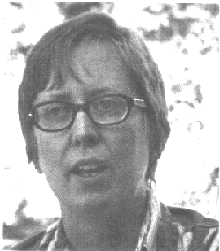|
"In
1972 I became a vegetarian. This has been extremely beneficial for several
reasons. First, I am happy that no animals must be killed to feed me.
Second, I find a vegetarian diet to be very nutritious, and it keeps me
healthy. Third, since I stopped eating meat, I find that I have less anger
and I am more peaceful, and this benefit continues to grow. I enjoy
cooking many different kinds of vegetarian food. In fact, we are now
raising a vegetarian cat who eats cereal, milk, and cooked vegetables and
refuses to eat commercial meat-based cat food.
In
1972 Sue and Kuo Chou decided to move to California, primarily to be
closer to the Master and his work. Meanwhile, after her extended teaching
experience and before beginning a Ph.D., Sue wrote a book for teachers,
Teaching the Young Child--A Handbook of 0pen Classroom Practice which was
published in 1975.
In
1976 Sue took refuge with the Triple Jewel under the guidance of the
Venerable Master and received the Dharma name Kuo Tsai. At that time she
also received the five precepts. "I keep the five precepts," she
comments, "and cultivate every morning and evening. I find Buddhism
to be very practical—it provides very specific methods for improving
your life, for reducing greed, hate, and stupidity, for ridding yourself
of dullness and confusion, and for helping others." She stresses the
importance of actual practice:
I
feel very fortunate to have the opportunity to learn from the Master's
example and from his teaching. But I know that I must work to take
advantage of this opportunity and not waste it. If I cultivate sincerely
and if I try to be always mindful of keeping the precepts in thought and
action, then I make progress, a little bit every day. But if I am lazy and
slack off, then I don't make any progress. It's up to me. Because of the
Master's great wisdom and compassion, I have this opportunity, but I must
do the work.
After
taking refuge, Kuo Tsai went to the Master to express her filial concern
for her mother. She explains, "For twelve years after my mother's
death, I had frequent disturbing dreams in which she appeared lonely and
distraught. In these dreams I felt helpless and was frustrated by my
inability to aid her. When I asked the Master how one could cross over
someone who had died, I was instructed that in addition to establishing a
memorial plaque that the five precepts could be administered to the one
"in darkness," that is the deceased one." In August of 1976
the Master compassionately administered these precepts to Kuo Tsai's
mother, and since that time she has not has any more disturbing dreams
about her mother.
Kuo
Tsai is a founding member of the Board of Trustees for Instilling Virtue
School and has acted as consultant to the School's principal, Terri
Epstein during its initial years of development.
At present Kuo Tsai is conducting a
research project for her Ph.D. dissertation investigating the relationship
between language development and reading ability in second grade children.
After completing the Ph.D., she hopes to work in teacher training and
curriculum development in reading and language arts for elementary school
children. |
